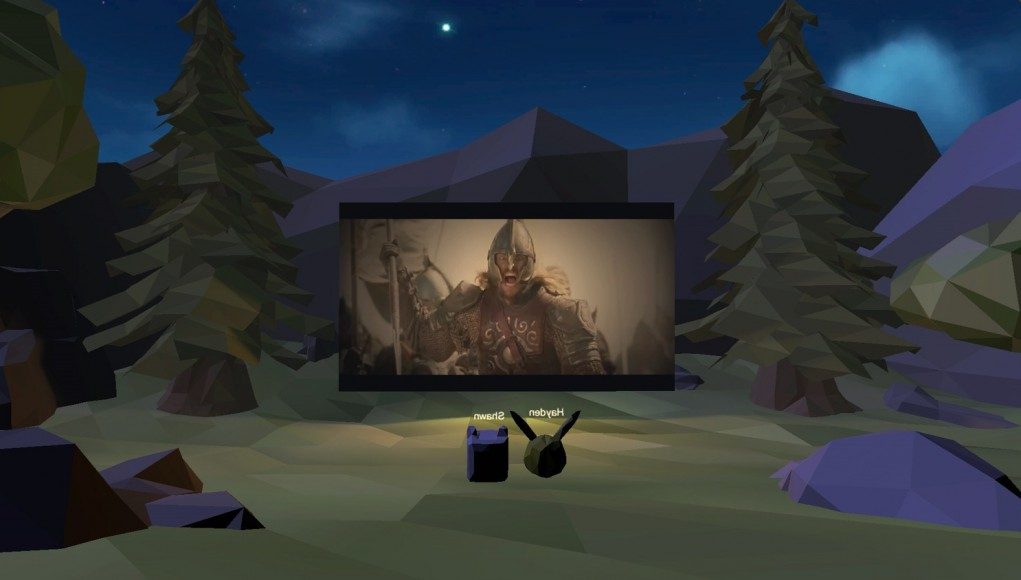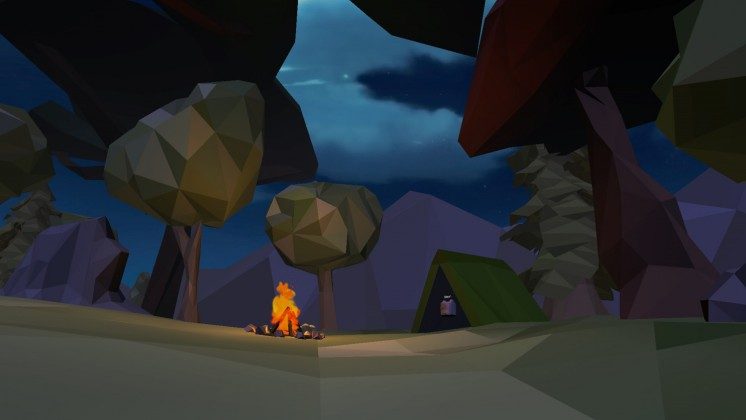Convrge, a social VR platform for the Oculus Rift, has been steadily building out its virtual space to enable multiplayer VR experiences. The latest version of the platform adds a shared movie screen for group viewings and additional space to the map.
Convrge is an in-development social VR platform that offers up a free space for virtual socialization. Now with a few dance-parties under their belt, with avatars bumping their head-tracked noggins to a shared beat, the team is adding a new wing to their low-poly (but high performance) forest-themed environment. The new area takes players through a cave to a natural amphitheater with a huge floating screen. The screen can be used to stream shared video and web pages which all participants can see.
The Convrge team shared with us a full list of changes for version 0.10, which is available now from their website:
- added a treehouse the overlooks the main valley
- added more small social areas around the main campfire
- added a new location, the theater, which you access via a cave that branches off of the main area
- added a new campfire / campground in the theater area
- added ability to stream from Youtube, Twitch, SoundCloud, Google Hangouts, a web browser, etc.
- on the website we’ve added a “see who’s online” feature that allows you to see who’s in the world
“We wanted to give Convrge users a space where they could organize their own events,” Convrge co-founder Shawn Whiting told me. “The theater is designed as an outdoor amphitheater and will work perfectly for a lot of events outside just movie or video watching. We think it will be great for VR AMA’s, meetups that want to use visuals, presentations, viewing livestreams with friends, etc. ”
To celebrate the new features and area, Convrge is holding a ‘Theater Grand Opening’ event tomorrow, Tuesday, February 24th at 9PM EST (find your timezone here), where they’ll be playing a selection of streamed videos with requests from the audience.
Whiting said that inspiration for the shared screen came as a combination of user feedback and the desire to recreate an experience which he and co-founder Hayden Lee do regularly.
“Hayden and I already spend a lot of time watching YouTube videos, TV shows, or Twitch streams with each other in real life, so we figured it would be fun to do the same thing with a lot more people in VR.”
For now the shared screen, like the music on the dancefloor elsewhere in the Convrge environment, is control by the developers. However, the duo plan to enable some level of public control soon.
“At the moment someone from Convrge needs to be there to change what appears on the screen,” Whiting said. “We’ll roll out the ability for anyone to control or recommend content to the screen after we’ve done an event or two with us behind the wheel. Once we hand over screen control to the community we will also be creating a lot more theater spaces so that there’s not only one room where people are fighting over screen time.”
Whiting also tells me that the team is looking for people interested in hosting their own events—meetups, talks, film screenings, music events, and more—within Convrge. If interested, Whiting encourages people to get in touch. To keep track of events and happenings within Convrge, check out the platform’s subreddit.









